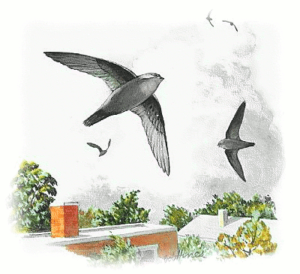You’ve been hearing strange sounds from your chimney. Not big sounds, but consistent and maybe a little disturbing. The good news is that it’s not forever. The  bad news is that it will likely get worse before it gets better.
bad news is that it will likely get worse before it gets better.
Most likely what you have are Chimney Swifts. And these birds are protected by the federal Migratory Bird Treaty Act. If there is an active nest, (one being built, one with eggs, or one with live babies) it cannot be touched – on pain of death. No, it will not really lead to death, but there are stiff fines that can be imposed that ARE very painful.
Protection of Chimney Swifts
The Chimney Swift Conservation Association is passionate about promoting education regarding these birds that resemble bats when in flight. The chimney swift is protected under the Migratory Bird Treaty Act and they should be handled with respect and care. As mentioned, once a chimney swift nests, it is illegal to remove it. So if it does nest in your chimney, you will have to wait until the bird leaves on its own. Proper handling and rehabilitation of these birds is of the utmost importance to ensure they continue to thrive in North America. Whether you choose to let chimney swifts in your chimney or would prefer they made a home elsewhere, there are humane ways of handling both.
What to do?
In most cases, if the birds haven’t found your chimney yet, a simple cleaning of your chimney and making sure your chimney is capped (fitted with an animal guard) will humanely protect them and your chimney.
There are also options to deal with this issue if the birds have already taken up residence:
- You can wait until the birds are gone for the season (September/October). When they leave for the year, the chimney can be swept to remove nesting material, droppings, etc. After that, it would be a good idea to install a cap with an animal guard so they can’t return to your chimney next Spring when they come back. Historically, it seems that once they find your chimney, they tend to come back every year.
- If you want to address it before then, an effort can be made to resolve the situation once the birds have completed the nesting process. The nesting process cannot be disturbed, so all hands are tied until the birds fledge (are able to fly out on their own) and they vacate the chimney.
It is crucial to pinpoint when they first began to chatter (sounds sort of like shaking maracas). Can you remember when you began to hear them make the chattering noise?
- 1 week old – chattering begins
- 3-4 weeks later adolescent birds can fly
You will need to schedule an appointment with your chimney sweep for about 4 weeks after the chattering begins. If all birds vacate the chimney after the nesting process is complete, your chimney sweep can service the chimney and install a cap.
Blue Sky Chimney Sweeps|Bless Your Hearth are your chimney sweeping professionals. Our certified and experienced technicians can sweep your chimney and cap it so no birds or other animals can call it home. Click here to contact us.
